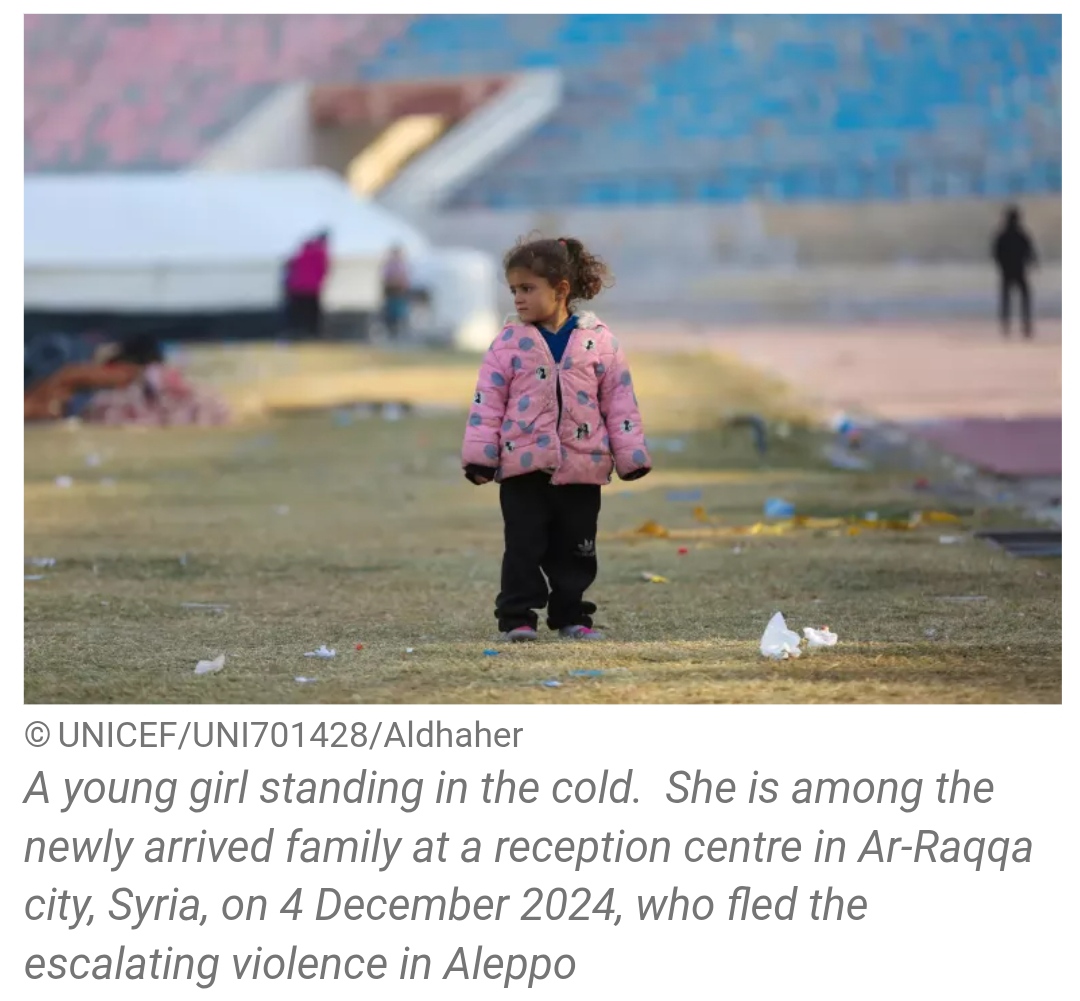UNICEF Urges Coordinated Global Effort to Secure a Better Future for Syria’s Children Amid Ongoing Humanitarian Crisis.
DAMASCUS:
Following a five-day visit to Syria, UNICEF Executive Director Catherine Russell highlighted the urgent need for a coordinated, global response to the country’s complex humanitarian crisis. The visit, which included engagements with the Caretaker Authorities, local communities, UN partners, parents, and children in Damascus, Aleppo, and Idleb, underscored the dire conditions faced by millions of Syrians and the critical role of international support in rebuilding the nation.
“Syria remains one of the most challenging humanitarian situations in the world,” Russell stated, emphasizing the devastating toll of over a decade of conflict that has left critical infrastructure in ruins and millions displaced. Despite this, a message of hope emerged from her discussions with the Syrian people. However, she stressed that significant, coordinated efforts at both the national and international levels are essential to pave the way for a future recovery.
Humanitarian Crisis and the Need for Immediate Action
Russell pointed out that approximately 16.7 million people in Syria, including 7.5 million children, require humanitarian assistance. With over 7.2 million displaced individuals, many of whom endure harsh winters in makeshift shelters, the situation is dire. Additionally, more than 85% of Syrian families are living in poverty due to the ongoing economic crisis.
The devastation of the country’s health system is equally concerning, with nearly 40% of hospitals and health facilities either partially or fully non-functional. Approximately 13.6 million people need improved access to water, sanitation, and hygiene services. The education sector has also been severely impacted, with 2.4 million children currently out of school and another 1 million at risk of dropping out, putting their futures in jeopardy.
Perhaps most alarmingly, children in Syria continue to face extreme violence and protection issues, including recruitment into armed groups and physical harm. Since the onset of the conflict, the UN has verified approximately 25,500 grave violations, including child recruitment and the killing or maiming of children. Creating a safe environment for children remains an urgent priority.
Resilience Amid Destruction
During her visit to Ma’arrat al Nu’man, a city once home to nearly 100,000 residents, Russell saw firsthand the severe destruction wrought by years of conflict. The city, now abandoned and marked by ruins, serves as a stark reminder of the challenges Syria faces in its recovery. Despite the devastation, Russell encountered families determined to rebuild their lives. However, she emphasized that this effort cannot be achieved without international assistance, including humanitarian demining efforts to clear the country of an estimated 324,000 unexploded ordnance (UXO). These UXOs remain a significant threat, having caused numerous child casualties, including the tragic case of 18-year-old Abdo, who lost his limb at the age of 14 after encountering an explosive device.
Syria’s Road to Recovery: A Call for Inclusivity and Gender Equality
Russell called on both the Syrian authorities and international partners to prioritize an inclusive transitional process that addresses the immense challenges facing the nation. She highlighted the importance of involving women and adolescent girls in the recovery process, advocating for their leadership in shaping Syria’s future across government, business, and humanitarian sectors.
UNICEF has been actively involved in supporting the Syrian population, including helping to sustain water systems reaching more than 7 million people, providing education to nearly 1 million children, and delivering vaccines to 470,000 children, half of whom were girls. However, Russell stressed that these efforts must be amplified and sustained to ensure that the children of Syria are not left behind.
International Support: A Critical Element for Success
Russell also called on the international community to take decisive action in supporting Syria’s recovery. This includes easing sanctions and facilitating measures to strengthen recovery and reconstruction efforts, which she said are essential for long-term stability. “Time is of essence,” she said. “Swift collective action is needed to restore hope, peace, and stability in Syria.”
A Future for Syria’s Children
At the heart of UNICEF’s efforts in Syria remains a commitment to securing a brighter future for the country’s children. Russell reiterated that the well-being and future of Syrian children must be central to all recovery and humanitarian efforts. As the country navigates its challenging transition, it is crucial that the international community acts boldly to support Syria in its path toward recovery.
“The children of Syria must remain at the heart of every effort,” Russell concluded. “Their future is on the line. Together, let us seize this opportunity and act boldly to secure a brighter tomorrow for every child in Syria.”



